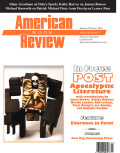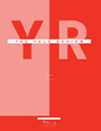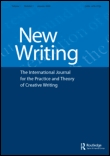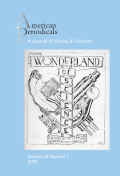
GEORGIA REVIEW
Scope & Guideline
Fostering a Community of Literary Innovators.
Introduction
Aims and Scopes
- Poetry and Creative Writing:
The journal showcases a wide range of poetic forms and styles, emphasizing both established and emerging voices in the poetry community. - Literary Essays and Criticism:
It provides a platform for critical essays that explore literary themes, techniques, and the cultural significance of various works and authors. - Diverse Perspectives:
The Georgia Review aims to highlight voices from various backgrounds, including underrepresented groups, and often focuses on themes of identity, diaspora, and cultural memory. - Interdisciplinary Approaches:
The journal encourages contributions that intersect with other fields, including visual arts, history, and social issues, providing a broader context for literary discussions. - Innovative Formats:
The journal often includes experimental formats and hybrid works that challenge traditional boundaries of literary genres.
Trending and Emerging
- Diaspora and Identity:
There is a growing emphasis on themes related to diaspora, migration, and identity, reflecting the experiences of individuals navigating cultural complexities and belonging. - Trauma and Healing:
Many recent works delve into personal and collective trauma, exploring narratives of resilience, survival, and the ongoing process of healing, resonating with current societal conversations. - Environmental and Ecological Concerns:
An increasing number of submissions engage with ecological themes, reflecting a heightened awareness of environmental issues and a desire to explore the relationship between humanity and nature. - Interdisciplinary Narratives:
There is a notable trend toward blending genres and disciplines, with works that incorporate visual art, historical context, and social commentary, creating a more holistic literary experience. - Personal and Intimate Voices:
Recent publications showcase a shift towards more intimate and confessional writing, where authors share personal experiences and reflections, inviting readers into their inner worlds.
Declining or Waning
- Traditional Narrative Structures:
There is a noticeable decline in the use of conventional storytelling techniques, with fewer submissions focusing on linear narratives and more on fragmented or experimental forms. - Classical Literary References:
Works heavily reliant on classical literature or historical references appear less frequently, suggesting a move towards more contemporary and personal subject matter. - Focus on Regionalism:
While the journal has historically included regional themes, there seems to be a waning interest in region-specific narratives in favor of broader, more universal themes. - Mainstream Genres:
There is a reduction in works that fit neatly into mainstream genres such as traditional romance or mystery, as the journal increasingly favors innovative and avant-garde approaches. - Conventional Poetic Forms:
The prevalence of traditional poetic forms, such as sonnets or villanelles, appears to be decreasing, with many submissions opting for free verse or hybrid styles.
Similar Journals

SOUTHERN HUMANITIES REVIEW
Exploring the Depths of Cultural DiscourseSOUTHERN HUMANITIES REVIEW, published by Auburn University, is a vital academic platform dedicated to the exploration and critique of diverse topics within the *Arts and Humanities*. Established in 1967, this journal serves as a conduit for innovative thought and scholarly dialogue, making it a significant contributor to its field despite its current ranking in the fourth quartile according to the 2023 Scopus categorization. With its ISSN 0038-4186 and E-ISSN 0038-4186, the journal has been a consistent publisher of scholarly articles from 2002 to 2016 and continues with its mission until 2024. Though it is not an Open Access journal, it offers valuable insights and peer-reviewed research that appeal to researchers, professionals, and students alike. The Southern Humanities Review remains committed to fostering a deeper understanding of the human experience, reflecting the complexities of cultural discourse in an ever-changing world. Researchers and practitioners will find it an enriching resource for contemporary humanities scholarship.

AMERICAN BOOK REVIEW
Championing Innovative Insights in LiteratureAMERICAN BOOK REVIEW is a pivotal journal in the fields of Cultural Studies and Literature and Literary Theory, published by the University of Houston, Victoria - Art & Science. Esteemed for its critical engagement with contemporary literary discourses, the journal provides a platform for scholars and practitioners to explore diverse narratives and theoretical frameworks that shape our understanding of literature. With an ISSN of 0149-9408 and E-ISSN 2153-4578, it serves as an essential resource for those seeking to deepen their insights into the intersection of literature and culture. Although positioned in the Q4 category for both Cultural Studies and Literature in 2023, the journal emphasizes the importance of inclusivity in academic dialogue, aiming to elevate lesser-heard voices in literary critique. Despite its challenging Scopus ranking, its commitment to fostering innovative scholarship makes it a noteworthy asset for researchers, professionals, and students alike. The journal's address is located at 3007 N Ben Wilson, Victoria, TX 77901, United States.

Fourth Genre-Explorations in Nonfiction
Advancing the Craft of Creative NonfictionFourth Genre: Explorations in Nonfiction is a distinguished scholarly journal published by Michigan State University Press, dedicated to advancing the field of nonfiction literature. With its ISSN 1522-3868 and E-ISSN 1544-1733, this journal aims to foster innovative discourse and critical engagement with the diverse modalities of nonfiction writing. As part of its mission, Fourth Genre emphasizes the exploration of creative nonfiction as an art form and a medium for cultural expression, serving as a vital platform for both established and emerging voices in literary nonfiction. Despite its current categorization in Q4 in Literature and Literary Theory, the journal strives to elevate its impact and reach, creating a space for rigorous scholarship and creative practice. Researchers, professionals, and students interested in the intricate relationships between narrative form, factual content, and literary artistry will find this journal indispensable for their academic and creative pursuits. From its inception in 2010 to its convergence period extending to 2024, Fourth Genre continues to play a pivotal role in shaping discussions around the art of nonfiction storytelling.

CLA JOURNAL-COLLEGE LANGUAGE ASSOCIATION
Connecting Educators and Researchers in Language and Literature.CLA Journal - College Language Association is a prominent academic journal dedicated to the exploration of language, literature, and education. Published by the College Language Association in the United States, this journal serves as an essential platform for researchers, educators, and students interested in the evolving landscape of language studies. With its coverage spanning from 2002 to 2020, CLA Journal has made significant contributions to the fields of Education, Linguistics, and Literature and Literary Theory, although its indexing in Scopus has been discontinued. The journal is categorized in the Q4 quartile for education and linguistics, indicating a niche but vital role in the academic community, while also achieving a Q3 ranking in literature. The journal occupies an essential space for those engaged in scholarly discourse, offering insightful perspectives and fostering dialogue across these interconnected areas of study.

YALE REVIEW
Fostering Dialogue Across Literary DisciplinesYALE REVIEW, with an ISSN of 0044-0124 and E-ISSN 1467-9736, is a prestigious literary journal published by Johns Hopkins University Press. Renowned for its exploration of literature and literary theory, it occupies a critical position in the academic landscape, as reflected in its Q3 ranking in the 2023 category of Arts and Humanities Literature. Spanning from 2009 to 2024, the journal aims to foster innovative dialogue among scholars, writers, and students by publishing interdisciplinary works that bridge classical literature with contemporary insights. Although it is not an open-access journal, the YALE REVIEW remains a valuable resource for those seeking to delve into the complexities of literary thought and expression. With its publication based in Baltimore, MD, the journal continues to contribute significantly to the discourse around literature, providing a platform for emerging voices and established scholars alike.

PARIS REVIEW
Illuminating Contemporary Literary InsightsThe Paris Review is a distinguished literary journal published in France that has gained acclaim for its contributions to the fields of literature and literary theory. Established as a leading platform for contemporary literary discourse, this journal brings together a diverse array of voices, from emerging authors to established literary figures, offering readers rich insights into the world of literature. Despite its Scopus Rank placing it in the 2nd percentile within its category, it serves as a vital space for debate, reflection, and exploration in literary scholarship. The journal spans multiple converged years, specifically from 2002 to 2014 and from 2016 to 2024, and continues to engage its audience with thought-provoking content. Although currently not an Open Access publication, it remains accessible to a broad readership, making it an essential resource for researchers, students, and literary enthusiasts seeking a deeper understanding of literary trends and theory.

New Writing-The International Journal for the Practice and Theory of Creative Writing
Advancing Conversations in Creative Writing Theory and PracticeNew Writing - The International Journal for the Practice and Theory of Creative Writing, published by Routledge Journals, Taylor & Francis Ltd, stands as a premier academic platform dedicated to exploring the intricate intersections of creative writing theory and practice. With an impressive impact factor reflecting its scholarly rigor and a prestigious Q1 ranking in the field of Literature and Literary Theory, this journal serves as a vital resource for researchers, professionals, and students alike. Covering a breadth of topics from innovative writing techniques to critical literary analysis, New Writing encourages the exploration of both emerging voices and established practices within the discipline. As it converges towards its 20th anniversary in 2024, the journal remains committed to fostering a dynamic discourse that enhances the global understanding of creative writing. Although it does not offer open access, its contributions are highly regarded in the academic community, making it an essential read for those looking to deepen their knowledge and engage with contemporary debates in creative writing.

AMERICAN POETRY REVIEW
Connecting Diverse Voices Through VerseAMERICAN POETRY REVIEW, published by Old City Publishing Inc, is a prominent journal dedicated to the exploration and celebration of poetry within the broader field of literature and literary theory. With an ISSN of 0360-3709 and an E-ISSN of 2162-4984, this journal serves as a critical platform for both emerging and established voices in poetry, showcasing a diverse array of poetic forms and critical essays that enrich the discourse surrounding this vital art form. Despite its Q4 ranking in the 2023 Literature and Literary Theory category, the AMERICAN POETRY REVIEW plays a crucial role in democratizing literary criticism and fostering collaboration among poets, scholars, and enthusiasts. The journal not only emphasizes the innovative potential of poetry but also provides insights into its cultural significance, aligning with the ongoing academic trends towards inclusive and interdisciplinary approaches in literature studies. Although it does not offer open access options, the publication continues to engage a dedicated audience from its headquarters in Philadelphia, PA, striving to elevate the visibility of contemporary poetry and its practitioners.

American Periodicals
Illuminating Literary Transformations Through PeriodicalsAmerican Periodicals is a leading journal published by Ohio State University Press, dedicated to the field of literature and literary theory. With an ISSN of 1054-7479 and an E-ISSN of 1548-4238, this journal has established itself as a significant platform for academic discourse, ranking within the Q2 category in the 2023 Scopus metrics for literature and literary theory. Converging from 2010 to 2024, it aims to explore the intricate relationship between periodicals and evolving literary practices. The journal invites researchers and scholars to contribute original research articles, critical essays, and reviews that illuminate the transformative impact of periodical content on literary culture. Although the journal operates under traditional access options, the lack of an open-access framework underscores its commitment to maintaining rigorous academic standards. American Periodicals is not only a valuable resource for students and professionals alike, but also a vital hub for cultivating innovative perspectives in literary analysis.

NOVYI MIR
Exploring the Depths of Humanities and CultureNOVYI MIR, published by IZD STVO IZVESTIYA, is a distinguished journal that provides a platform for scholarly discourse in the humanities, literature, and cultural studies. With an ISSN of 0130-7673, this journal has made significant contributions to the academic community, particularly within Russia and Eastern Europe. Although it does not currently offer an open access model, its content is revered for its quality and depth, catering to researchers, professionals, and students alike. With a commitment to examining contemporary issues through a literary lens, NOVYI MIR is essential for those seeking to explore the intersection of culture and society. The journal's relevance is underscored by its esteemed reputation in literary circles, making it a vital resource for anyone dedicated to understanding the nuances of Russian literature and thought.